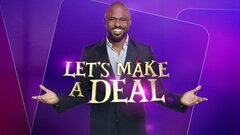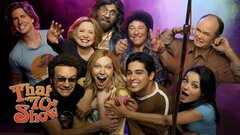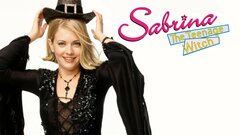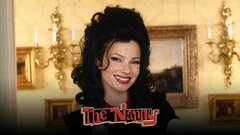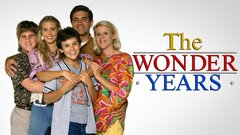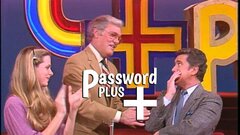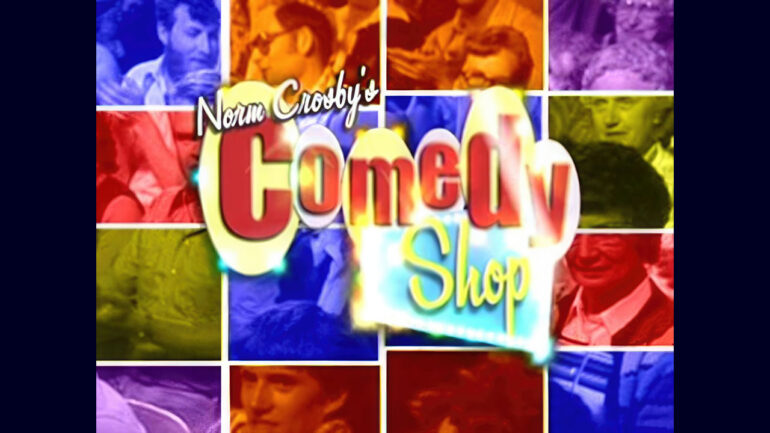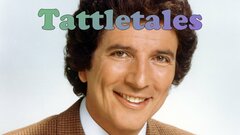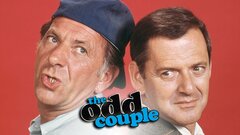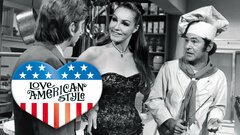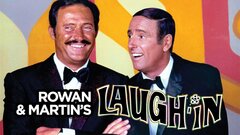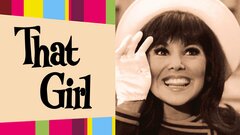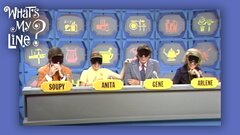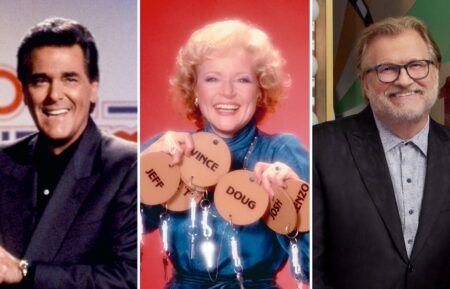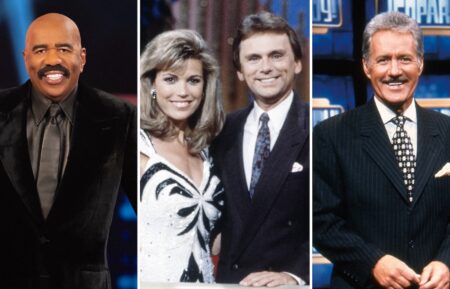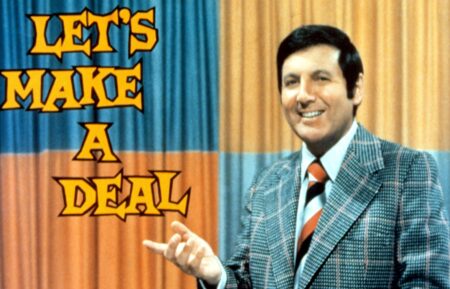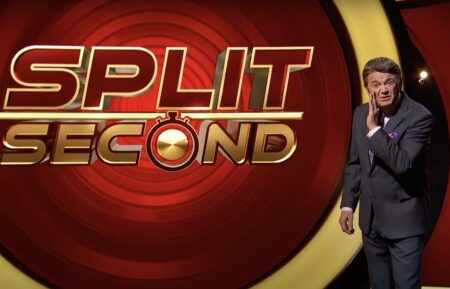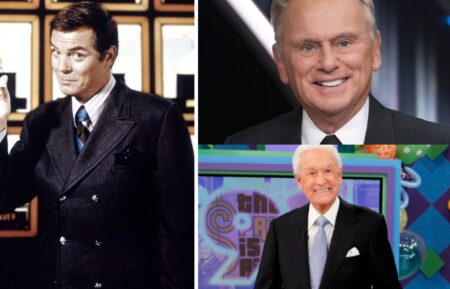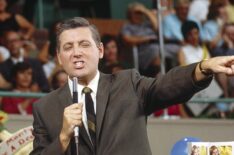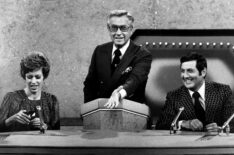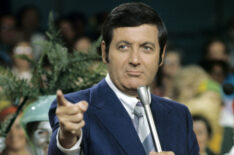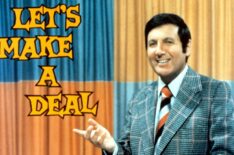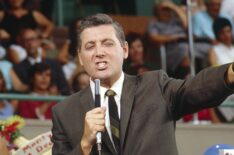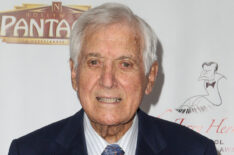One of the most well-known game show hosts in American television history, Monty Hall, was the host and co-creator of the wildly irreverent "Let's Make a Deal" (NBC/ABC/CBS/syndicated, 1963-1986, 1990-91, 2003, 2009- ). A former radio host in his native Canada, Hall came to the United States to seek his fortune on television, and in 1963, struck it rich with "Deal." Its seemingly chaotic structure, which saw contestants win and lose prizes based largely on chance and Hall's whim, found a massive audience during its lengthy run on all three networks.
Key to its success was as its offbeat prizes, as well as the gusto with which audience members tried to curry Hall's favor by wearing outlandish costumes. Though "Deal" was Hall's main outlet, he produced numerous other game shows and enjoyed a minor second career as a guest and occasional actor on television series. The enduring popularity of the program, which saw numerous revivals over the course of its four decades on the air, ensured that Hall would remain a well-loved figure in the history of television game shows. Monty Hall died on September 30, 2017 at the age of 96.
He was born Monte Halperin in Winnipeg, Manitoba, Canada on Aug. 25, 1921, the son of slaughterhouse owner Maurice Halperin and Rose Halperin, a radio and stage actress. After graduating from St. John's High School in the city's colorful North End, Hall worked a series of menial jobs before accepting a loan from a local businessman to attend the University of Manitoba. His intention was to become a doctor, but the university's medical school would only accept three or four Jewish students per year. Frustrated, he turned to theater and radio, finding part-time work as a disc jockey at Winnipeg's CKRC.
After graduating from the university in 1945, Hall served in the Canadian Army during World War II, where he served as an emcee for various military shows. Upon his return to civilian life, he approached the CKRC management about fulltime work, but was advised to seek more gainful work elsewhere.
In 1946, Hall moved to Toronto, where he landed a job at CHUM, where, under suggestion from the management, he began working as Monty Hall on a daily musical show called "Wake Up and Smile." The following year, he married future Emmy-winning producer Marilyn Plottel of "Do You Remember Love?" (CBS, 1985) fame, with whom he had three children: Tony-winning actress Joanna Gleason, television producer Sharon Hall and TV executive Richard Hall. He left CHUM to develop a 15-minute quiz show called "Who Am I?" which pressed listeners to identify a mystery personality and mail in their answers on box tops. It was Hall's first hit, and aired through syndication throughout Canada for over a decade.
He then set his sights on the Canadian Broadcasting Company in hopes of finding work as a television host. Hall proposed a then-unique concept to the company - a late night variety show that mixed interviews with live performances - but saw his idea first rejected and then produced by the company without him or his consent. Convinced that his fortune lay outside of Canada, he left for New York City in 1955.
Hall found work at NBC, first as co-host of the Saturday night broadcast of the influential radio and TV series "Monitor" (1955-1975), and later as host of several local children's shows. Hall also provided colorful commentary for the New York Rangers' radio broadcasts from 1959 to 1960 before landing his first American hit series with "Video Village" (CBS, 1960-62), a morning quiz show that pitted contestants against each other on a life-sized game board. Hall followed the series to Los Angeles when future "Hollywood Squares" (NBC/syndicated, 1966-2004) producers Merrill Heatter and Bob Quigley took the show West, where the second and most significant chapter of his career took shape.
In 1962, Hall teamed with writer-producer Art Stark, who would also work on "The Tonight Show Starring Johnny Carson" (NBC, 1962-1992), to create his first network game show, "Your First Impression" (NBC, 1962-63). Among its producers was TV veteran Stefan Hatos, who formed a production company with Hall. Their first offering was an offbeat game show called "Let's Make a Deal," which hinged on a simple if chaotic premise: Hall, as host, selected audience members at random to participate in a blind trade: they could accept the prize given to them by Hall, or trade it for an unknown item hidden behind one of three doors, behind a curtain, or in a box.
The hidden items were either significant prizes, like money or goods, or it was a "Zonk" - an outlandish gag gift that could be anything from toys to live animals or a demolished cars. Participants were frequently selected on the basis of their outrageous costumes or signs, or if they possessed a random item sought by Hall, like a driver's license with a certain number on it.
Deal" also produced a very popular probability puzzle, dubbed the "Monty Hall problem," which explored the numerous variables involved in the show's central gimmick: if a contestant picked one door, which revealed a car, and Hall opened a second door, which featured a "Zonk," would it be to the contestant's advantage to accept Hall's offer to trade the car for the possibility of an even greater prize (or loss) behind the third door? Since the decision often hinged on Hall's offer, which varied from situation to situation, the problem was frequently the subject of vigorous academic debate. Dismissed by critics as mindless and demeaning to its audience, "Let's Make a Deal" was a runaway success with viewers, who tuned it to see the offbeat prizes and Hall quip with the excited contestants. The series would remain at the top of the daytime ratings for the majority of its multi-decade run, which saw it bounce between NBC (1963-68, 1990-91) and ABC (1968-1976), while maintaining equally successful tenures in syndication (1971-77, 1980-81, 1990-91). Its success made Hall a star, and he divided his time throughout the 1960s and 1970s between his hosting duties on "Deal," producing and hosting other series through his company with Hatos, and occasional appearances on episodic series, mostly as himself.
As producer, Hall never found a worthwhile successor to "Deal." With Hatos, his second game show of the 1960s was "Chain Letter" (NBC, 1966), with comedian Jan Murray as host; it was followed in 1972 by the more popular "Split Second" (ABC/syndicated, 1972-75, 1986), which asked contestants to give one of three possible correct answers for a series of questions. Other efforts, like a revival of "Masquerade Party" (syndicated, 1974-75) and "It's Anybody's Guess" (NBC, 1977), with Hall as host, failed to last beyond a season, but "Deal" kept Hall both active and very lucrative.
He received his star on the Hollywood Walk of Fame and penned his autobiography, Emcee Monty Hall, in 1973, and parlayed his popularity into a string of one-shot variety series, including "The Monty Hall Smokin-Stokin' Fire Brigade" (ABC, 1972) and "Monty Hall's Variety Hour" (ABC, 1976), which featured an early television appearance by comedian Andy Kaufman. In 1979, he hosted "The All-New Beat the Clock" (CBS, 1979-1980), the only game show on which he appeared but did not produce.
In addition to his busy television schedule, Hall became a tireless campaigner for a number of international charities, including the Muscular Dystrophy Association, the Diabetes Center, and the Pancreatic Cancer Program. He was inspired to do so by his mother, who frequently sponsored charitable organizations, even when her family was struggling to stay financially afloat. Hall was most closely associated with Variety Clubs International, which raised funds for disadvantaged children. He was elected president of the organization in 1975, and then became lifetime chairman in 1981 before receiving its International Humanitarian in 1983. Five years later, his native country honored him with its highest award, the Order of Canada, for his humanitarian work around the globe. Over the course of his decades of philanthropic work, Hall estimated that he had raised $800 million for Variety and other charities.
In 1986, Hall hosted a syndicated revival of his second most popular series, "Split Second." It lasted a season, and within a few years, Hall had decided to retire from active hosting duty. In 1991, he officially stepped down as the host of "Deal," which ended its network run that same year. Hall spent most of his time during this period on various television specials, documentaries on game shows and the occasional television series, like "That '70s Show" (Fox, 1998-2006).
In 2002, he was inducted into the Order of Manitoba, and received his star on Canada's Walk of Fame that same year. Hall was also among the first group of inductees into the Game Show Hall of Fame in 2005. In 2009, "Let's Make a Deal" returned to CBS as a replacement for "Guiding Light" (CBS, 1952-2009). Comedian Wayne Brady was tapped to host, but Hall was never far from the show's epicenter. He was credited as "creative consultant" on the new show, and in 2010, co-hosted the show with Brady to great acclaim from fans across the country. Monty Hall died of heart failure at the age of 96 on September 30, 2017.


